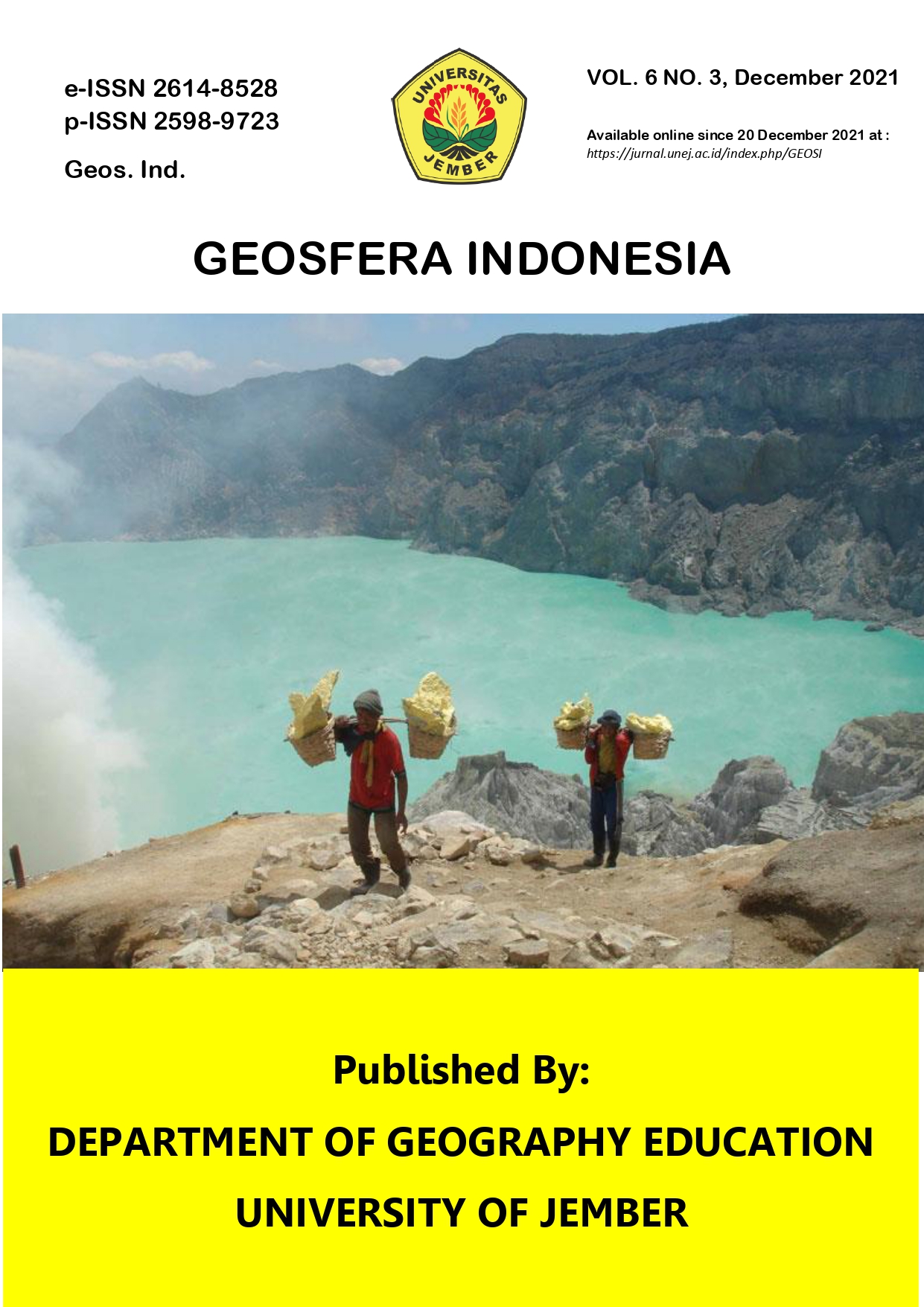Analysis of Mapping Forest, Settlement, and Rice Field Areas in Konawe Selatan District, Indonesia
DOI:
https://doi.org/10.19184/geosi.v6i3.27484Keywords:
analysis, forest, rice field, settlement, mappingAbstract
The rampant land-use change in Konawe Selatan District and the uncontrolled use leads to disaster and environmental stability effect, consequently, mapping the area function is important for controlling land-use activities to reduce the risk of disaster. Therefore, this study aims to determine the direction, distribution, and effective area of the function of forests, settlements, and rice fields. This study used a regional survey with a quantitative approach. Base map data of administrative, slope class, soil type, rainfall, and land-use obtained from the regional planning agency and SAS Planet were used and analyzed with quantitative descriptive analysis overlayed with scoring. The result showed that the direction of area functions was dominated by limited production forests by 50.05% while the distribution of protected forest function was spread across 14 sub-districts with limited production forests in all sub-districts, production forests in 17 sub-districts, settlements in 21 sub-districts, and rice fields in 9 sub-districts. Furthermore, the effective area shows that all area functions are accordance with the directions, except for rice fields which took over the function of forest while the effective area controlled by the regional planning shows that all area functions need correction following the regulation of the Minister of Agriculture of Indonesia. Areas which do not accordance with the function need to be evaluated, hence, regional planning is required to be revised by the people's representative in Konawe Selatan.
Keywords: Analysis; Forest; Rice field; Settlement; Mapping
Copyright (c) 2021 Geosfera Indonesia and Department of Geography Education, University of Jember

This work is licensed under a Creative Commons Attribution-Share A like 4.0 International License
Downloads
References
Appannagari, R. R. (2018). Environmental pollution causes and consequences: A study. North Asian International Research Journal of Social Science & Humanities, 3(8), 151–161.
Basu, M. (2017). Fundamentals of environmental studies. Mapana - Journal of Sciences, 14(4), 53–56. https://doi.org/10.12723/mjs.35.5
Cahyadi, A., Marfai, M. A., Rahmadana, A. D. W., & Nucifera, F. (2012). Perencanaan penggunaan lahan di kawasan karst berbasis analisis kemampuan lahan dan pemetaan kawasan lindung sumberdaya air. Seminar Nasional Science, Engineering and Technology. https://doi.org/10.31227/osf.io/6b49a
David, D. (2016). Sistem informasi geografis pemetaan lokasi ideal taman nasional di wilayah Kalimantan Barat. Creative Information Technology Journal, 3(3), 242–254. https://doi.org/10.24076/citec.2016v3i3.81
Decree of the Agriculture Minister Number 837 year 1980. (1980). Surat Keputusan Menteri Pertanian Nomor: 837/Kpts/Um/11/1980 tentang Kriteria dan Tata Cara Penetapan Hutan Lindung. https://mrbudisantoso.files.wordpress.com/2009/02/kriteria-hlhp-keppresmentan.pdf
Deris, D., & Ramli, R. (2019). Kesesuaian penggunaan lahan permukiman di Kecamatan Katobu dan Kecamatan Duruka Kabupaten Muna berbasis SIG. Jurnal Penelitian Pendidikan Geografi, 4(3), 20–30. https://doi.org/10.36709/JPPG.V4I3.8338
Dibyosaputro, S. (2016). Landform control on settlement distribution pattern in Progo Delta, Indonesia. Indonesian Journal of Geography, 47(2), 187–193. https://doi.org/10.22146/IJG.9264
Farizki, M., & Anurogo, W. (2017). Pemetaan kualitas permukiman dengan menggunakan penginderaan jauh dan SIG di kecamatan Batam kota, Batam. Majalah Geografi Indonesia, 31(1), 39–45. https://doi.org/10.22146/mgi.24231
Fitrianti, F., Sugiyanta, I. G., & Miswar, D. (2013). Pemetaan arahan fungsi pemanfaatan lahan untuk kawasan fungsi lindung di Kecamatan Gisting Kabupaten Tanggamus. Jurnal Penelitian Geografi, 1(5), 1–5. http://jurnal.fkip.unila.ac.id/index.php/jpg/article/view/2713
Hadmoko, D. S., Lavige, F., Sartohadi, J., Gomez, C., & Daryono, D. (2017). Spatio-temporal distribution of landslides in Java and the trigerring factors da. Forum Geografi, 31(1), 1–15. https://doi.org/10.23917/forgeo.v31i1.3790
Hamdani, H., Permana, S., & Susetyaningsih, A. (2014). Analisa daerah rawan banjir menggunakan aplikasi sistem informasi geografis (Studi kasus Pulau Bangka). Jurnal STT-Garut, 12(1), 1–13. http://jurnal.sttgarut.ac.id/index.php/konstruksi/article/download/283/257
Hardianti, A., & Harudu, L. (2019). Pemetaan persebaran hutan menurut klasifikasi arahan fungsi kawasan hutan di Kabupaten Konawe Selatan berbasis SIG. Jurnal Penelitian Pendidikan Geografi, 4(3), 79–88. https://doi.org/10.36709/jppg.v4i3.8344
Kurnianto, F. A., Apriyanto, B., Nurdin, E. A., Ikhsan, F. A., & Fauzi, R. B. (2018). Geographic information system (gis) application to analyze landslide prone disaster zone in Jember Regency East Java. Geosfera Indonesia, 2(1), 45–53. https://doi.org/10.19184/geosi.v2i1.7524
Latif, A. (2014). Desain sistem informasi geografis pemetaan dan letak kawasan hutan lindung Kabupaten Merauke. Jurnal Ilmiah Mustek Anim Ha, 3(3), 248–266. http://ejournal.unmus.ac.id/index.php/mustek/article/view/198
Law Number 26 year 2007. (2007). Undang-Undang Nomor 26 Tahun 2007 tentang Penataan Ruang.
Lesmana, I., & Purnama, A. A. T. (2017). Sistem informasi geografis (SIG) dalam pemetaan hasil hutan produksi di wilayah Kabupaten Kuningan. Buffer Informatika, 1(1). https://doi.org/10.25134/buffer.v1i1.574
Li, X., Wang, Y., Li, J., & Lei, B. (2016). Physical and socioeconomic driving forces of land-use and land-cover changes: A case study of Wuhan City, China. Discrete Dynamics in Nature and Society, 2016, 1–11. https://doi.org/10.1155/2016/8061069
Luxfiati, A., & Harudu, L. (2019). Pemetaan distribusi fungsi kawasan hutan di Kabupaten Muna berdasarkan sistem informasi geografis (GIS). Jurnal Penelitian Pendidikan Geografi, 4(4), 151–163. https://doi.org/10.36709/jppg.v4i4.9231
Mann, B., & Saultz, A. (2019). The role of place, geography, and geographic information systems in educational research: AERA OPEN, 5(3), 1–5. https://doi.org/10.1177/2332858419869340
Margono, B. A., Turubanova, S., Zhuravleva, I., Potapov, P., Tyukavina, A., Baccini, A., Goetz, S., & Hansen, M. C. (2012). Mapping and monitoring deforestation and forest degradation in Sumatra (Indonesia) using Landsat time series data sets from 1990 to 2010. Environmental Research Letters, 7(3), 034010. https://doi.org/10.1088/1748-9326/7/3/034010
Masyhuri, W. (2019). Analisa perubahan penggunaan lahan terhadap potensi banjir di Kecamatan Medan Denai. Tunas Geografi, 7(2), 127. https://doi.org/10.24114/tgeo.v7i1.7192
Maula, F. K., Choerunnisa, D. N., & Akbar, R. (2019). Mapping informal settlements using geospatial method. IOP Conference Series: Earth and Environmental Science, 385(1), 012035. https://doi.org/10.1088/1755-1315/385/1/012035
Panek, J., & Sobotova, L. (2015). Community mapping in urban informal settlements: Examples from Nairobi, Kenya. Electronic Journal of Information Systems in Developing Countries, 68(1), 1–13. https://doi.org/10.1002/j.1681-4835.2015.tb00487.x
Regional Law Number 19 year 2003. (2013). Peraturan Daerah Kabupaten Konawe Selatan Nomor 19 Tahun 2013 tentang Rencana Tata Ruang Wilayah Kabupaten Konawe Selatan Tahun 2013-2033.
Rika, H., Susilo, B., & Nurjani, E. (2016). Geographic information system-based spatial analysis of agricultural land suitability in Yogyakarta. Indonesian Journal of Geography, 47(2), 171–179. https://doi.org/10.22146/IJG.9260
Sakarov, O. D. (2019). Analisis kesesuaian lahan untuk lokasi permukiman di Kabupaten Belu Nusa Tenggara Timur. Jurnal Planologi, 16(1), 16–31. https://doi.org/10.30659/jpsa.v16i1.3945
Sejati, A. E., Kasmiati, S., & Ikhsan, F. A. (2019). The relationship between learning process interactions and student’s learning outcomes in environmental sustainability matter geography-social science education subject. IOP Conference Series: Earth and Environmental Science, 282(2019), 012026. https://doi.org/10.1088/1755-1315/382/1/012026
Sejati, A. E, Hasan, M., Nursalam, L. O., Harianto, E., & Deris, D. (2020). Kesesuaian pemetaan penggunaan lahan pemukiman dengan kondisi sebenarnya di Kecamatan Katobu dan Kecamatan Duruka Kabupaten Muna. Tunas Geografi, 9(1), 55–68. https://doi.org/10.24114/tgeo.v9i1.17732
Setiawan, H., Sudarsono, B., & Awaluddin, M. (2013). Identifikasi daerah prioritas rehabilitasi lahan kritis kawasan hutan dengan penginderaan jauh dan sistem informasi geografis (Studi kasus: Kabupaten Pati). Jurnal Geodesi Undip, 2(3), 31–41.
Shankar, S. J. (2012). A study the status of environment education about awareness among, the urban community at Jalgaon District. Scientific Research and Reviews, 1(2), 49–59.
Stewart, T. J., & Janssen, R. (2014). A multiobjective GIS-based land use planning algorithm. Computers, Environment and Urban Systems, 46, 25–34. https://doi.org/10.1016/J.COMPENVURBSYS.2014.04.002
Suryadi, S., Aipassa, A., Ruchaemi, R., & Matius, M. (2017). Studi tata guna kawasan taman hutan raya bukit soeharto. Jurnal Penelitian Ekosistem Dipterokarpa, 3(1), 43–48. https://doi.org/10.20886/jped.2017.3.1.43-48
Suryani, A. I. (2019). Reboisasi/penghijauan (Peran serta masyarakat dalam penanggulangan bencana longsor). Jurnal Spasial, 4(1), 1–9. https://doi.org/10.22202/js.v4i1.1752
Wardhana, W., Widyatmanti, W., Soraya, E., Soeprijadi, D., Larasati, B., Umarhadi, D. A., Hutomo, Y. H. T., Idris, F., & Wirabuana, P. Y. A. P. (2020). A hybrid approach of remote sensing for mapping vegetation biodiversity in a tropical rainforest. Biodiversitas Journal of Biological Diversity, 21(9), 3946–3953. https://doi.org/10.13057/BIODIV/D210904
Zulfikar, M., Barus, B., & Sutandi, A. (2013). Pemetaan lahan sawah dan potensinya untuk perlindungan lahan pertanian pangan berkelanjutan di Kabupaten Pasaman Barat, Sumatera Barat. Jurnal Ilmu Tanah Dan Lingkungan, 15(1), 20–28. https://doi.org/10.29244/jitl.15.1.20-28



